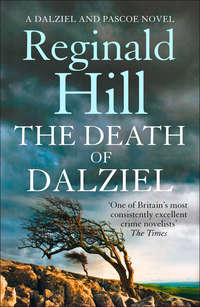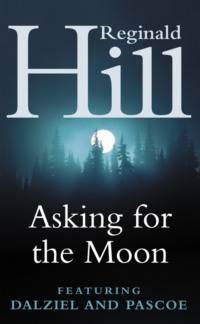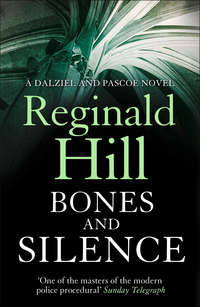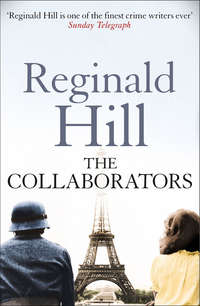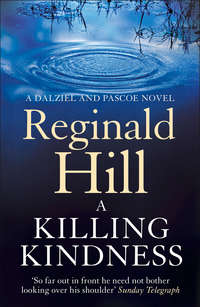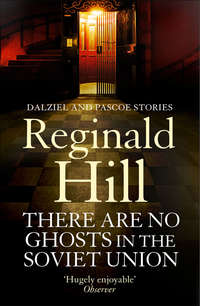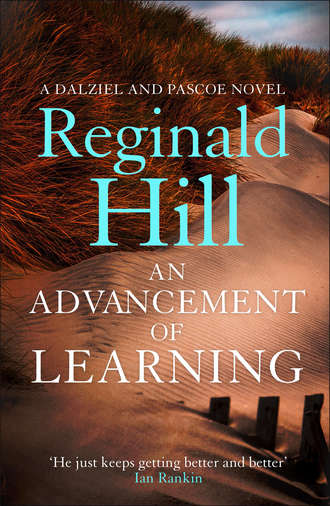
Полная версия
An Advancement of Learning

REGINALD HILL
AN ADVANCEMENT OF LEARNING
A Dalziel and Pascoe novel

Copyright
This novel is entirely a work of fiction. The names, characters and incidents portrayed in it are the work of the author’s imagination. Any resemblance to actual persons, living or dead, events or localities is entirely coincidental.
Harper An imprint of HarperCollinsPublishers 1 London Bridge Street, London SE1 9GF
www.harpercollins.co.uk
Copyright © Reginald Hill 1971
Reginald Hill asserts the moral right to be identified as the author of this work
A catalogue record for this book is available from the British Library
HarperCollinsPublishers has made every reasonable effort to ensure that any picture content and written content in this ebook has been included or removed in accordance with the contractual and technological constraints in operation at the time of publication.
All rights reserved under International and Pan-American Copyright Conventions. By payment of the required fees, you have been granted the nonexclusive, nontransferable right to access and read the text of this ebook on-screen. No part of this text may be reproduced, transmitted, downloaded, decompiled, reverse engineered, or stored in or introduced into any information storage and retrieval system, in any form or by any means, whether electronic or mechanical, now known or hereinafter invented, without the express written permission of HarperCollins ebooks.
HarperCollinsPublishers has made every reasonable effort to ensure that any picture content and written content in this ebook has been included or removed in accordance with the contractual and technological constraints in operation at the time of publication.
Source ISBN 9780586072592
Ebook Edition © July 2015 ISBN 9780007373987
Version 2015-06-18
Dedication
For Malcom & Anne
Mike & Jo
Jim & Kathy
Contents
Cover
Title Page
Copyright
Dedication
Epigraph
Chapter 1
Chapter 2
Chapter 3
Chapter 4
Chapter 5
Chapter 6
Chapter 7
Chapter 8
Chapter 9
Chapter 10
Chapter 11
Chapter 12
Chapter 13
Chapter 14
Chapter 15
Chapter 16
Chapter 17
Keep Reading
About the Author
Also by the Author
About the Publisher
Epigraph
… to have the true testimonies of learning to be better heard, without the interruption of tacit objections, I think good to deliver it from the discredits and disgraces it hath received, all from ignorance; but ignorance severally disguised; appearing sometimes in the zeal and jealousy of divines; sometimes in the severity and arrogance of politiques; and sometimes in the errors and imperfections of learned men themselves.
SIR FRANCIS BACON
The Advancement of Learning
Chapter 1
If a man will begin with certainties, he shall end in doubts; but if he will be content to begin with doubts, he shall end in certainties.
SIR FRANCIS BACON
The Advancement of Learning
There had been a great deal of snow that December, followed by hard frost. A few days before Christmas a thaw set in, temperatures rose steeply, the snow became slush. The sun greedily sucked up the moisture till it saturated the air and impinged on all the senses.
Fog.
You could smell it in the great industrial towns, its edge of carbon and sulphur biting into the windpipe.
You could see it clearly wherever you looked. But it was all you could see.
You could taste it if you walked out in it without a scarf or kerchief wrapped round your mouth.
You could feel it, damp and greasy, on your skin. Almost under your skin.
And you could hear it. No sound passed through it that it did not muffle and crush and make its own.
It made driving difficult but not impossible. If you drove with care, if your motivation was strong and impelling, it was possible to get to your destination.
Flying was impossible.
Airport lounges filled. And overfilled. And over-spilled. Till the atmosphere of damp and smoke and noise and frustration was almost as bad as the fog outside.
Occasionally it raised itself off the ground. Sometimes long enough for a plane to taxi out on the runway. Sometimes long enough for a plane to get away, which made the waiting even more unbearable for those still crammed in the restaurants, bars and lounges.
Confusion breeds confusion. People found themselves separated from their baggage, their tickets, their passports and sometimes even other people. Some went home and bought a frozen turkey the next day. Some cancelled their flights at the airport, some claimed refunds later. Passenger lists became as scrappy as leaves from the Delphic oracle.
Finally a light wind breathed out of the southwest a couple of times and brought back the reassuring stars.
It was a warm wind. It blew gently over half of Europe, melting what remained of the great snows at sea-level.
Higher up, however, it proved more difficult. Which was good, for it was the snow that most of the thousands marching in still dubious queues across black, wet runways were seeking.
But sometimes the wind’s breath blew long enough and hot enough to loosen the grip which the long, frozen fingers of snow had fastened on the side of steep and deep.
Which was bad.
Merry Christmas.
The hot June sun glinted merrily on the placid blue sea, the long white sands, the unconscious sun-bathers and a little farther inland, the balding head of Douglas Pearl, solicitor, through the open windows of the long committee room. A neurotic motion to close the windows in the interests of security had been ignored by the chairman, who now waved Pearl and the girl who accompanied him to their appointed seats.
‘Forgive me, sir,’ said the solicitor, standing up immediately he and the girl had been seated, ‘but before we begin, may I formally establish that all those present are members of the governing body of Holm Coultram College of Liberal Arts and Education?’
‘Of course we are,’ said Captain Jessup, his grey eyebrows twitching in surprise.
‘And you, sir, are Captain Ernest Jessup, the Chairman of this body?’
‘I am indeed, sir,’ said Captain Jessup with greater acerbity, understandable as he and his questioner had played golf together only two days earlier.
‘And I take it, sir, that there is present here today a quorum of that body?’
‘You would not be here else,’ snapped the Captain. ‘Is that all?’
‘I think so, sir,’ said the solicitor, unperturbed. ‘In cases like this it is always as well to establish the standing in law of the body involved right at the beginning. There have been cases …’
‘I’m sure, I’m sure,’ said the Captain. ‘Let’s get a start. I may add I’m quite willing to accept that you are Douglas Pearl, solicitor, and that this is your client, Miss Anita Sewell.’
He smiled frostily at the girl who sat with her head bowed forward so that her long blonde hair hung like a curtain over her face.
‘Now,’ said the Captain. ‘As you all know, this meeting has been convened to hear the appeal of Miss Sewell against a decision of the Academic Board of the college.
‘The Academic Board at a meeting held on May 20th of this year decided that Miss Sewell should be instructed to withdraw from the college. In other words, my dear,’ he said, addressing the girl directly and in a kind voice, ‘you were dismissed.’
Pearl rolled his eyes upwards till the whites showed, a movement Captain Jessup did not miss.
‘The grounds for this decision were that Miss Sewell’s work in all subjects was of a standard sufficiently low to cause concern, and that in one subject, biology, she had sunk below a point from which it was possible for her to attain the lowest pass level by the end of her course. Miss Sewell was informed of this decision and the grounds of it. Later she decided to make use of her right of appeal to the Board of Governors, pending which appeal she has been, I believe, suspended.’
The girl nodded.
‘Now,’ said Captain Jessup, pressing his hands flat on the table before him. ‘Now. We have already seen the academic evidence on the basis of which Miss Sewell was dismissed.’
‘Suspended,’ said Pearl.
Jessup ignored him.
‘So I think the best interests of all would be suited if we passed straight on to the grounds of your appeal, my dear.’
Pearl coughed.
‘Miss Sewell has asked that I should lay out the general grounds of her appeal to start with, Mr Chairman. Then, under my advice, of course, she will be willing to answer questions.’
‘I see. Well, I suppose that’s in order?’ said Jessup. No one seemed disposed to question this.
‘Good. Then carry on.’
The solicitor shuffled a couple of papers in front of him. Under his polite, rather mild exterior there had long lurked a desire to try his hand at the kind of histrionic advocacy popular a century earlier. Magistrates’ courts offered little opportunity. Or encouragement. And looking at the row of attentive faces before him with Jessup’s challenging glare in the middle, he decided reluctantly that in the interests of both his own reputation and his client’s appeal this was not the time to start.
But he wasn’t too worried. What he had to say contained enough built-in drama to take the complacency out of their faces.
‘Mr Chairman, ladies and gentlemen,’ he began quietly, ‘my client has been following a bipartite course at the College and the main ground of the Academic Board’s decision to instruct her to withdraw was failure in one part of the course, that concerned with biology. The main evidence to this effect was given by Dr Fallowfield, Senior Lecturer in that subject and Miss Sewell’s principal tutor.’
The girl stirred slightly at the name and with an almost unconscious movement of her left hand brushed the hair back from her face. She was very attractive.
Pearl paused for effect. Captain Jessup made a moue of distaste at even this slight bit of dramatic business and Pearl was glad he had tried no more.
‘Today her appeal comes before you,’ he went on flatly, avoiding any undue stress, ‘and it is based on two things. A piece of information and an allegation. The information requires no comment from this body, I feel. We live in a modern era. It is this: for the past two years, until last term in fact, Miss Sewell was the mistress of Dr Fallowfield, the lecturer I have just mentioned. It is with reluctance that my client reveals this. It is with greater reluctance that she asserts that Dr Fallowfield has deliberately falsified her assessment grades to bring about her apparent failure.’
The man on the ladder rested his elbow unselfconsciously on the shining brown breast.
‘We could saw her off at the ankles,’ he said reasonably. ‘That’d be easiest. Otherwise she’s likely to come apart almost anywhere.’
One of his mates guffawed. The man on the ladder shot him a disapproving glance.
Marion Cargo ignored him and concentrated all her attention on the eight-foot-high bronze nude which towered before her. She (Marion, not the bronze) was in her late twenties, as slim as the nude was Rubenesque, dressed in black slacks and a loose grey sweater, her only concession to the fact that she lectured in Art at the college being her ear-rings, two crystals dangling at the end of long silver chains.
‘There’s a solid block of concrete down there as a foundation, you see, miss,’ explained the man. ‘This thing’s set in it. Pretty solid too, I’d say, otherwise it’d have keeled over long since.’
‘Yes, I know,’ said Marion. ‘But I’d rather the legs weren’t cut.’
‘No one’d know,’ assured the man. ‘We’ll dig the base out separate and they can be stuck back together later somehow if the thing’s not going for scrap. She might lose half an inch or so, but she can spare it, eh?’
He slapped the nude affectionately.
‘Like I say, who’d notice? No one, except the joker who made it, perhaps, wherever he is.’
He laughed.
‘That was me,’ said Marion calmly. ‘But it’s not just that. We’ll have to think of a way. I don’t want her cut. There are other reasons.’
She bent down and looked at the inscribed plaque set into the shallow platform on which the statue rested.
TO THE MEMORY OF
ALISON GIRLING
1916–1966
Her memorial is around you.
She was conscious of the overalled men regarding her with semi-amused eyes, but she made no attempt to brush the tears from her eyes before standing upright again.
‘No,’ she repeated. ‘I don’t want her cut. There must be a way.’
Chapter 2
There is yet another fault often noted in learned men, that they do many times fail to observe decency and discretion in their behaviour and carriage.
SIR FRANCIS BACON
Op. Cit.
Conversation stopped for a moment when Fallowfield came into the Common Room. He moved swiftly to the coffee-table and waited till Miss Disney had poured herself a cup. A smile played around his lips as she replaced the coffee-pot firmly on the table and moved away without a glance at him.
He poured a cup and made a bit of business out of taking a couple of sips while he surveyed the constitution of the various groups scattered around the room.
Grouping tended to be by departments for morning coffee. The geographers sat huddled together as though plotting some government’s overthrow. The English Department lay back easily in their chairs, not speaking, but with faint smiles on their faces as though someone had said, or was just about to say, something elegantly witty. Three mathematicians looked gloomily at each other like unwilling companions on a long train journey. At the far end of the room, the historians were quarrelling again, just before the stage where objective social discussion became personal infighting. Henry Saltecombe, their departmental head, almost recumbent in the deep armchair which was his own, surveyed them benignly over his swelling paunch. Glancing round, he caught Fallowfield’s eye and made a pouring motion with his hand.
Fallowfield picked up the coffee-pot and went across to join him.
‘Hello, Sam,’ said Henry cordially. ‘Pour us a cup, there’s a love. You’re a silly fellow to be here when you could still be pigging it in bed.’
‘There are things to do,’ said Fallowfield non-committally. He sat down and refilled his own coffee-cup.
‘Anyway,’ he added, melting a little to Henry’s cordiality, ‘it’s a rare experience to be able to feel like Lord Byron after the scandal. Though nobody actually got up and left!’
‘Not quite,’ muttered Arthur Halfdane, one of the young historians at the table, jerking his head so that his long hair tossed like a girl’s.
Fallowfield followed his gesture and saw the slight angular figure of Jane Scotby, the Senior Tutor, wriggle out from under the menacing overhangs and promontories of Edith Disney and move across the room towards him.
‘Mr Fallowfield,’ she said in her high precise voice. ‘I wonder if I could have a word with you?’
Fallowfield stared thoughtfully into her small brown wrinkled face whose bright blue eyes stared back as unflinchingly at his round, rather solemn features.
‘Of course, Miss Scotby,’ he said. ‘Won’t you sit down?’
‘I would prefer that we were private,’ she said.
‘I find that hard at the moment,’ said Fallowfield equably.
‘Very well,’ said Miss Scotby. ‘It has been suggested to me …’
‘By Miss Disney?’
‘… that your suspension from duty makes it improper for you to be present in the Senior Common Room or indeed in the College.’
‘This is outrageous,’ spluttered Henry. The younger historians, constitutionalists to a man, sat forward in their chairs, eager to offer an opinion at the drop of an amendment.
‘I am unable to pronounce authoritatively on the legality of this,’ Miss Scotby went on inexorably, ‘but on other grounds I can see good reason why it might be better if you weren’t here.’
She halted, just a little breathless. Fallowfield suspected that beneath the brown parchment skin a flush might be struggling to break out.
‘Miss Scotby,’ he said kindly, ‘I have merely been temporarily suspended from my teaching duties here. I certainly do not intend trying to teach anything except perhaps a few lessons in corporate feeling and loyalty.’
He raised his voice slightly and glanced round the room.
‘I am suspended. I haven’t caught leprosy. So I won’t wear a bell. And I shall continue to use this room as of right until I am shown why in law I should not.’
‘And if that happens, you shall be my guest,’ added Henry Saltecombe, his jowls shaking in emphasis.
The historians glanced at each other and raised their eyebrows in wry humour. Miss Scotby nodded as though she had expected nothing else. Which was probably true, thought Arthur Halfdane. Or at least she had the art of always giving the impression that whatever happened was expected.
A pretty young woman with a determined chin, Eleanor Soper of the Social Science department, came across in pursuit of the coffee-pot, apparently unconscious of the tension. Halfdane smiled at her and pulled up another chair beside his own. She sat down.
Miss Scotby nodded again as if this, too, were expected, turned on her heel and, avoiding Miss Disney’s imperious beckonings, walked smoothly out of the room.
‘Nicely timed,’ said Halfdane to Eleanor.
‘Why?’ she said. ‘What’s up with Scotby?’
‘Gone to earth,’ said Henry with a chuckle. ‘Walt’s furious.’
He was the only person in the college who actually addressed Miss Disney as ‘Walt’ to her face.
‘Now, Sam,’ he said, ‘what’s the latest? If it’s not sub judice or something.’
He rubbed his podgy hands in mock-enthusiastic expectation.
How mock is it? wondered Halfdane.
‘There’s nothing new. I’ve agreed to go before the governors to make a statement, but not while the student governors are present. They’re still trying to sort out the legalities.’
‘Well,’ said Henry dubiously. ‘The students are after all legally elected members of the governing body. In any case, I’m surprised that you are bothering, Sam. Points of order and matters constitutional have always bored you to tears in the past.’
A general movement towards the doors prevented any reply from Fallowfield.
‘What’s on?’ asked Halfdane.
‘By Christ!’ said Henry, pushing his fifteen stones breathily out of the chair. ‘They’re going to shift Hippolyta, her of the golden tits, begging your pardon, Miss Soper. This we mustn’t miss!’
‘What?’
‘The statue. Al’s statue. Acres of thigh swinging on high! Coming, Sam?’
‘No, thanks,’ said Fallowfield, shaking his head moodily, his recent liveliness in the face of the enemy now completely evaporated. ‘I don’t think I will.’
‘See you later then.’ He puffed cheerily away, followed by the slight figure of Halfdane. Soon there was only one other person left in the Common Room. She came to a halt by Fallowfield’s chair.
‘Yes, Miss Disney?’ he said without looking up.
‘Mr Fallowfield,’ she said loudly, as though speaking to someone much more distant. ‘Whatever the outcome of this business, I should like you to know I consider your admitted conduct to be absolutely deplorable. You have debauched a charming and delightful young girl. Should you be acquitted …’
‘I’m not on trial,’ observed Fallowfield, but it wasn’t worth the effort.
‘… and stay on at the college, I warn you there are other matters I may have to speak of. Other matters. You follow me, I have no doubt.’
She left in a shudder of flesh and a crash of door.
Fallowfield whistled a couple of bars of ‘The Dead March’.
‘Glass houses to you, Miss Disney,’ he murmured. ‘Bloody great glass houses.’
He finished his coffee and poured himself another cup even though it was cold.
The giant mechanical shovel-cum-crane lumbered through the herbaceous border on to the lawn of the staff garden. Miss Scotby winced visibly and Miss Disney took a step forward as though to lay herself beneath its tracks.
It was as well she didn’t. The ground was baked hard by the summer sun, but still the vehicle’s metal teeth left a deep imprint in the level green turf.
The college gardener, who had tended it and watered it to the last, spoke a word which normally would have caused the Disney bosom to push indignantly against the Disney chin. Now she nodded sadly as though in full accord.
‘What happens now?’ asked Halfdane.
‘I think they’ve drilled most of the base out of the concrete,’ said Henry, pointing with his much-chewed pipe. ‘Now they’ll take the strain with that thing, finish the drilling and haul away. Look. Here comes Simeon.’
The long, wirily energetic figure of Simeon Landor, the college principal, came striding from the mellow, castellated sandstone building known as the Old House which backed on to the garden.
‘Hello, Principal. Come to see the fun?’
Landor shook his head in reproof.
‘No fun, Saltecombe. A sad moment, this. For us all. Very sad.’
He raised his voice slightly. Miss Disney, who was standing some yards away, shot him an indignant glance and turned her back.
Halfdane had come in at the tail-end of this particular saga, but as usual with the help of the inveterate chronicler by his side he was in full possession of the facts.
The college had expanded rapidly since Landor had taken over as principal five years earlier on the death of Miss Girling, whose services to the college were commemorated by this very statue.
When he came, the place had been a teachers’ training college for some two or three hundred girls, though for the first time men were being admitted the following September. Now it covered a much wider range of courses, vocational and academic, some leading to degrees from the new university of East Yorkshire, situated some fifteen miles to the south. Numbers of students, staff and buildings had risen rapidly, and now the Old House, the early nineteenth-century mansion which once housed the entire college, was the centre of a star of concrete and glass. But it was an incomplete star. In one direction lay half an acre of cultivated beauty which had once been a source of pride and joy to Miss Girling and still was to Miss Scotby and Miss Disney and many others. It was like an artifact created for a nurseryman’s catalogue. It had everything, including a fringed pool and a ferned grot, and from the first crocuses in spring till the last dahlia in the autumn it was ablaze with colour. Above all, it had the long, level lawn, the finest Solway turf, five thousand square feet without a blemish. Till now.
For the Landor plan needed the garden. Where the blushing flowers had once risen in such profusion a new growth was going to gladden the eye, or some eyes at least. A biology laboratory.


